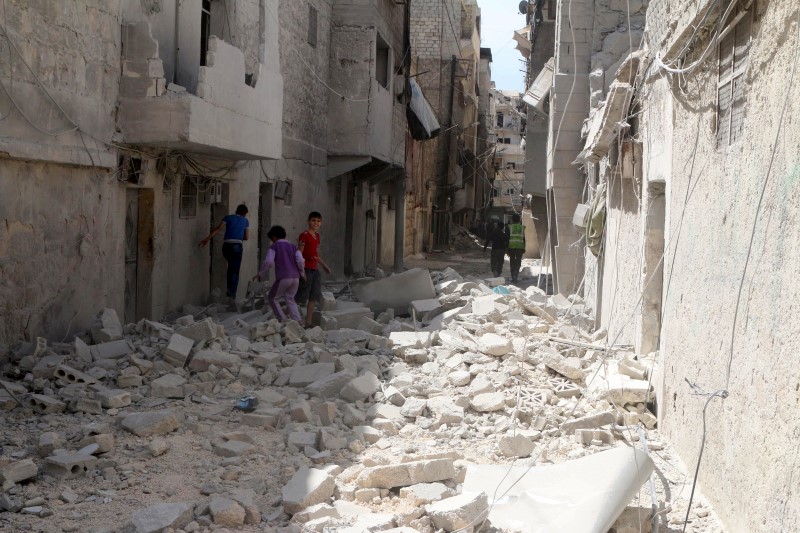By Angus McDowall and Tom Miles
BEIRUT/GENEVA (Reuters) - Syria's army backed by Russian warplanes launched an assault north of Aleppo on Thursday, threatening to block a vital rebel route into the city in fighting that has cast new clouds over Geneva peace talks.
Syria's recent upsurge in fighting, particularly around the northern city of Aleppo, has proven the most acute challenge yet to a cessation of hostilities deal agreed in February and soured an already bleak mood as opposing sides gather in Geneva.
Outlining its bargaining position, the opposition High Negotiating Council (HNC) told Reuters it would be willing to share equally in a transitional council with the government, but repeated its rejection of a role for President Bashar al-Assad.
The Syrian government, buoyed by Russian and Iranian military support, has ruled out any discussion of the presidency. Moscow and Tehran have also rejected what they see as Western efforts to predetermine Assad's future.
The warring sides have sought to portray the fighting as the fault of the other, pushing towards breaking point a ceasefire that was designed to improve the political climate ahead of the Geneva talks.
In addition to the Aleppo assault, heavy government air strikes were reported north of Homs, where a doctor described the most intense government bombardment since the cessation of hostilities agreement took effect.
In Aleppo, government forces and their allies were focused on the area around Handarat Camp, overlooking an important access point held by rebels into the city, which is split into zones held by the government and opposition.
"The escalation started at night. The area is of great importance. If the regime advances, this will tighten the grip on Aleppo," said Abdullah Othman, head of the politburo of the Levant Front rebel group.
"VERY FIERCE" RUSSIAN BOMBING
Speaking to Reuters, he described the battle as "to-and-fro" and said: "the bombing is Russian, and very fierce". His account was echoed by the Syrian Observatory for Human Rights, a British-based group that monitors the war.
Separately, the monitor said it had received information that Islamic State hit and may have brought down a Syrian jet near the southern city of Sweida although the pilot had apparently been rescued. Amaq, a news agency close to the militants, also said IS had downed a Syrian army plane.
Syrian state TV reported that the army had seized control of the northern part of Handarat camp, to the north of Aleppo, after fierce battles with armed groups. A number of militants had been killed, it said.
Handarat camp is important because it is perched on a hilltop above a main road leading to opposition-held districts of the city.
The government and its allies have launched several major offensives in the Aleppo area, cutting the rebels' shortest supply line to Turkey in February. Yet rebels still control territory around the city, including its western approaches.
Fighting near Aleppo has been escalating for two weeks, mostly to the south of the city where government forces backed by Lebanon's Hezbollah and other militias have been waging fierce battles with rebels including Nusra Front fighters.
The al Qaeda-linked Nusra Front and Islamic State groups are not included in the cessation of hostilities agreement.
Speaking in Moscow, Russian President Vladimir Putin accused the rebels of breaching the truce to reconquer lost ground. "The opposition is trying to recover what they lost," he said.
Putin, who last month decided to withdraw some of the Russian forces deployed to Syria, said Moscow had left Damascus in a position to launch major offensives.
The air strikes in Homs hit five towns and villages, killing one person and wounding a number of others in Talbiseh, said Doctor Mohamad al-Shamsi, speaking from the area. "Warplanes were flying at low altitudes for nearly an hour. A number of raids were launched on Talbiseh and al-Houla," he said.
Rebels north of Aleppo are also facing a separate attack by the Islamic State group, which is trying to retake territory at the Turkish frontier lost in recent days to other insurgent groups backed by Turkey.
OPPOSITION WANTS TO HEAR GOVT IDEAS ON ASSAD
The Geneva talks aim to end a war that has killed more than 250,000 people, created the world's worst refugee crisis, and allowed for the rise of the Islamic State group.
U.N. special envoy Staffan de Mistura has said he wants the resumed talks to focus on a political transition, one of the most contentious issues, with the opposition and its allies insisting Assad must be removed at the start of the process.
HNC spokesman Salim al-Muslat said in an interview there were "many people on the other side who we can really deal with". "We will have no veto, as long as they don't send us criminals, as long as they don't send us people involved in the killing of Syrians," he said.
The opposition wants the transition to be run by a governing authority that has full executive powers. Damascus has, however, signalled that the most it is willing to offer is a "unity government" with opposition participation, and a new constitution.
Assad's supporters, including Iran, say he should be able to run in a future presidential election.
Putin said: "It is necessary to accept - for all to agree and sit down at the negotiating table - to accept the constitution and on the basis of the constitution to hold elections. That is the way to get out of the crisis."

Muslat said there was room for negotiation on how to handle Assad's departure: "For a solution, to really help Syria to get relief, then let them suggest what they want for Assad and we discuss it."